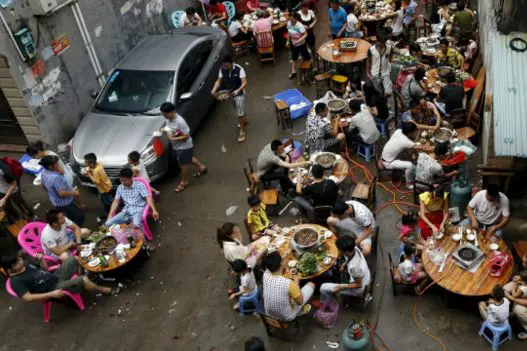The traditional midsummer dog meat festival in a southern Chinese city has opened amid criticism, and it seems that the festive air has been somewhat diluted this year.
The festival is held in Yulin City, Guangxi Zhuang Autonomous Region, every summer solstice. Called a carnival of cruelty by many, the festival has been bombarded by animal rights activists and dog lovers for years.
"Business is especially bad this year. I could sell over 30 dogs every day in previous years, but now I can only sell five at the most," said a butcher in the city who would only give his family name Zhong.
Zhong, who has been in the business for 20 years, blames the dog lovers, saying that many of his old customers dare not buy dog meat for fear of getting into trouble.
In recent years, some protestors have gone into the streets of Yulin during the festival, kneeling down or holding protest signs in front of diners.
"My son, a high school student, used to eat dog meat with us, but he decided to never eat it again last year under pressure from his friends," he said.
Traditionally, residents would butcher tens of thousands of dogs on the streets, but the bloody spectacle is a rare sight in the city today.
Xie Pingqing, 46, said that his family has given up their tradition. "The environment has changed and there is much moral pressure on dog eaters today," he said.
Xie also noted that some people who avoid going to dog meat restaurants still cook it at home.
Legitimate tradition or barbarism?
As a custom dating back to the Ming Dynasty (1368-1644), Yulin residents ate dog meat with lychee at summer solstice, believing the practice keeps illness at bay.
In the eyes of local resident Zhong Guanghai, the festival is associated with happy memories of family gatherings. "Since I was a child, my family would gather on this day, eating dog meat and lychee while drinking lychee wine. It has always been a sweet moment," he recalled.
However, protestors see the custom as an act of brutality. Chen Tianhai, an animal rights activist, said, dogs are friends of human beings and eating dog meat is disrespectful and uncivilized.
A dog lover who only gave his surname Yang said the practice has given rise to an unregulated industry and endangers public health, as many dogs were stolen and poisoned. Much of the meat is completely unregulated.
Yulin officials said the festival is a public event, and the government has never had a hand in it, but has improved supervision over the dog meat industry.
Wan Li of the city animal husbandry and veterinary bureau said that the government organizes campaigns against dog theft every year and is strict with inspection of dog meat.
Some believe that arguments over the event simply show diverse social values. Zhou Xiaozheng, sociologist and professor with Renmin University of China, said the protests reflect a conflict between folk tradition and animal protection. It is a responsibility for citizens to heighten their awareness of animal protection, but at the same time, different dietary habits should be given due respect, Zhou said.
Xie Pingxiang, deputy head of Guangxi traditional culture research institute, said both animal rights activists and traditionalists should learn to see both sides of the issue and understand each other.
The existence of diverse values is a sign of social development, he added.
(APD)
 简体中文
简体中文

